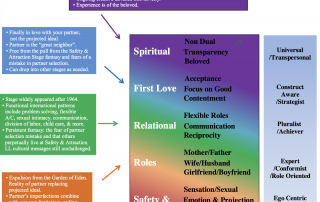
Measuring Attention to Positive Subliminal Cues
Measuring Attention to positive subliminal cues via an emotional Stroop task that suggest a Pre-transcendent Fallacy held by Intimate Couples Thomas A. Habib, Ph.D. & Christine A. Baser, R.N., Ph.D. Abstract An emotional Stroop task was utilized on 248 women to measure subliminal cues that were equated with the hypothesized pre-trans fallacy. This study was a 2 x 2 design that employed a dual task attention paradigm. There were two IV, 26 stimulus words presented subliminally, and two videos. The stimulus words had 3 levels ranging from romantic (adore), to non-romantic (helpful) to inanimate (door). All the words were lexically balanced and rated by women for category fit. The videos were of [...]
Charts
Download HERE Download HERE Download HERE Download HERE Download HERE Download HERE Download HERE Download HERE
A Couples Line of Development by Dr. Tom Habib
Abstract A Couples Line of Development Thomas A. Habib A couples line of development is proposed from an integral perspective. The couples line specifies developmental stages, tasks for each stage and describes cultural messages that impede development. It reveals the nature and effects of an integral concept called a pre/trans fallacy, unique to early intimate relationships, and how this often results in arrested development at the second and third stages. It locates the efforts of therapists who provide conjoint therapy, identifies developmentally targeted skill training, while providing both couples and therapist much needed direction for future growth. It also locates lower right (LR) quadrant structures that provide “rules for the road”, [...]
INTIMATE COUPLES Regression and Lower-Right Supporting Structures Thomas A. Habib
Abstract The couples relationship can be volatile and chaotic when it fails to regulate regression unique to the in mate dyad. One of the issues that distinguish the in mate relationship from all others is the influx of regression that interjects earlier developmental aspects of self into the present, which then must be processed by the couple. The capacities to express and balance regression are not as strongly needed in non-in mate relationships. Regression involves powerful feelings of sensitivity and vulnerability that are frequently expressed in withdrawal behavior or anger. This angry enactment of perhaps one’s earlier unresolved issues predictably elicits a defensive response in a partner. This article explores the [...]





